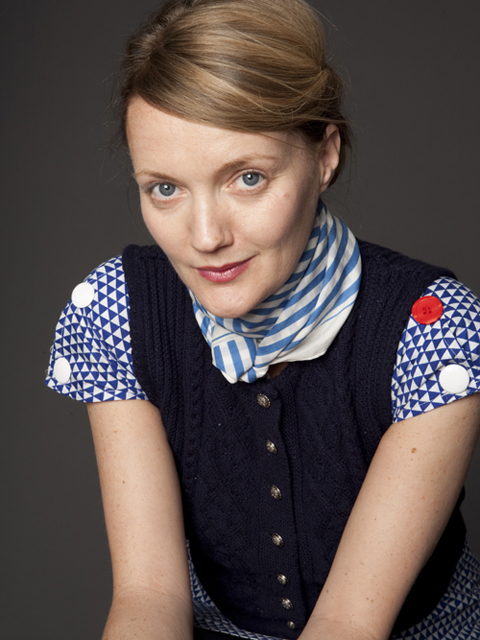
Documentary filmmaker Eva Mulvad is a walking, talking advertisement for her new film, The Good Life. She has good looks, a good marriage and a successful career. And wearing a European-styled dress with large white buttons (one red, a replacement), she entered my daughter Leslie Hassler's photographic studio sporting an adorable three-month-old baby on her shoulder. But her current film is about "the good life" that's been lost by two nearly helpless women, the last two members of a wealthy Danish family whose money has run out. While that predicament will seem sad to anyone who hasn't seen it, the film is actually humorous and entertaining. I asked Mulvad how she found this story.
I was looking for a subject that had more of the character of a novel. Documentaries tend to have a journalistic approach. One day as I was driving my car, I heard this radio documentary with these two women who had been living on their inherited wealth in Portugal for a long time. Their speech was interesting. They have this antique, almost royal way of speaking Danish, so you can hear that they're from the upper class and that they haven't lived in Denmark for a long time. The father has just died. No one in this little family has ever worked. But now they've spent it all their inherited money and are hopelessly bad at being poor.
 Eva Mulvad / Photo by Leslie Hassler
Eva Mulvad / Photo by Leslie Hassler
The daughter, Anne Mette, is 56, and she has nothing on her resumé. Besides having gone to posh parties in Paris, Nice and Monaco, she hasn't done a lot with her life. She and her mother, Mette, 83, struggle to live on the small government pension the mother gets. But the day the mother dies, Anne Mette will have nothing. So it's a very desperate situation for her, but she wasn't brought up to deal with things. It's a vicious circle. So that story had enough drama to appeal to me for a documentary.
Falling out of their jet-set-induced cocoons as worms, not butterflies, the women struggle mentally as well as physically to adjust to a new and alien world. Filming these two over two years, we see how they live in fear of losing their tiny flat near the sunny Portuguese Riviera if they don't make the rent. They resort to borrowing from friends, buying groceries on credit, and paying a dentist with a painting.
"During the filming, Anne Mette realized she had to get a job. So we show her visiting the unemployment office where she has to stand in line with people who were her family's former servants," says Mulvad.
We also steal a peek at Anne Mette's first job interview, where she is more preoccupied with the possibility of walking her dog during working hours than saying what she can do for the company. "It's the mind-set of someone who's never had to get up and go to work," says Mulvad.
This story can be seen as a real life Humpty Dumpty tale about the folly of feeling secure when the wall you are sitting on is propped up by money you didn't and couldn't earn yourself. Given today's precarious global economics, this true story can serve as a kind of moral alert for everyone in this topsy turvy world that is causing great shifts while trying to balance itself.
Mulvad's own "good life" extends to how she funds her documentaries. "We have a good system in Denmark, with public money for documentary film work. We co-fund most of our documentaries from state money coming from taxes, and the other part comes from Danish Television, a national system," she says. Ah, the sensible, socialized Danes who prize the knowledge gleaned from documentaries and support their filmmakers gladly.
We will hear more from Mulvad. She is a daring filmmaker who counts among her awards the Sundance Film Festival's 2007 World Cinema Jury Prize for her film Enemies of Happiness. The subject of that film was a young radical Afghan woman who won a seat in the Afghanistan Parliament from a small village run by warlords.
"She had to run an underground campaign, but we followed that and she won," Mulvad says. "I'm still in touch with her. She's now been voted out for publicly saying the Parliament didn't work, was corrupt and was no better than a stable full of animals. That was too much for them. There have been four attempts on her life, actually."